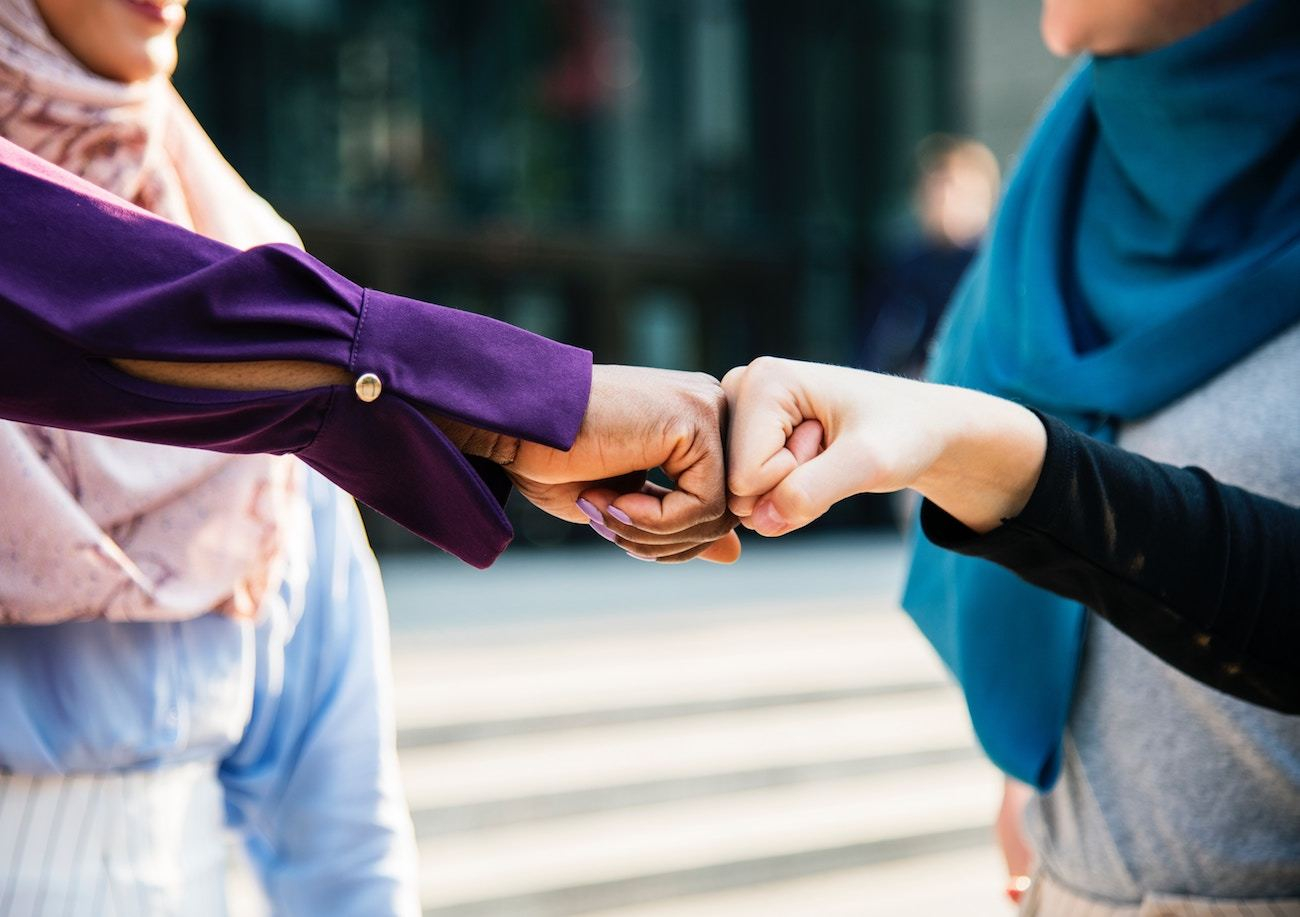Coping With Domestic Violence & What You Can Do To Help Victims: Part I
Lifestyle
|
Sep 9, 2018
|
7 MIN READ

TRIGGER WARNING: This post contains content related to domestic violence. There are NO graphic images.

Each year 10 million women and men in the U.S. are victims of domestic violence, defined by the National Coalition Against Domestic Violence (NCADV) as the act of emotional, psychological or physical violence perpetrated by an intimate partner.
Victims include women and men in the Muslim community, who are often shunned from speaking up by cultural norms or "religious" beliefs. Often, people who are facing violence are not aware their situation is dire and face opposition when seeking assistance.
What does Domestic Violence Look Like?
Domestic violence isn’t pretty. It can be in the form of emotional abuse like manipulation, or blackmailing, financial abuse, like limiting access to necessities or preventing someone from working to have a better quality of life, physical harm, including, but not limited to, hitting, punching, kicking, choking, slapping, threatening to kill. Psychological effects can include putting a partner down, belittling them or calling them names. Victims can become depressed, suicidal or have symptoms of Post Traumatic Stress Disorder (PTSD) as a result of facing domestic violence.
Tehmina Tirmizi, the Program Coordinator for Domestic Harmony Foundation, a New York-based nonprofit organization which assists South Asian, Middle Eastern and Muslim women with resources for domestic violence, said many women face criticism from their own families or in-laws, which deters them from seeking help. Women also factor in their lack of support, or effects on their children before making decisions to seek assistance. Each case is unique, she said.
The Foundation formed in 1992, out of the Islamic Center of Long Island, by a group of women who saw a need to step up and assist those in need. It connects people to educational resources, counseling, legal services and most importantly, a listening ear. Tirmizi said something very important: people facing violence lose their sense of self-worth and are sometimes subjected to further violence if they speak up. Therefore, a friend, neighbor or family member may be going through a difficult time and unable to come forth.

Common Misconceptions & Judgements about Domestic Violence:
1. Victims should just pray and be patient: Abusers tell their victims the abuse is being inflicted due to them. It is also widely believed that if people “pray” or are “patient” their situation will become better. Tirmizi said people do not realize; people should never have to struggle like this. The abuse is not the fault of the victim.
Yasmin Mogahed, an instructor at Al-Maghrib Institute, writer and motivational speaker, once wrote that the purpose of patience is not to suffer, rather it is to change and grow as people;
"'Sabr' is not standing still. Sabr is not being passive. Sabr is the endurance necessary to make the change needed to *move* one step closer to where Allah (S) wants us to be. God created pain, in both the physical and spiritual world, as a wake up call. As a motivator and accelerator towards action, movement, and change to alleviate the pain...Be brave enough to dig deep, to be honest. And then to take the action and change necessary to save your life.”
2. If a person doesn't "look like an abuser", he/she can't possibly be one! Abusers come in all shapes and sizes. They can be the most “religious” person, one who prays five times a day in the masjid, the biggest donor at the masjid, or the nicest person in town. You cannot recognize an abuser by face value. Abusers may seem like charming people in greater society, further alienating a victim from getting help, as the abuser may use that as a fear factor saying, “No one will believe you when you tell them I did this to you.”
3. Victims of abuse choose to keep themselves in their situation when they don't seek help. Although Muslim women and men tend to go to an Imam, or other religious figures, as the first line of defense when seeking assistance in a domestic violence matter, not all religious figures are equipped with the tools and knowledge of the effects of domestic violence. Some religious figures focus on the physical family or “fixing” the problem with “more spirituality” such as suggesting pray more or read Quran and learn the hadith.
There is a lack of awareness of the implications of what actually happens behind closed doors, but Tirmizi is hopeful. She says the trend is slowly shifting and religious authority figures have been referring victims to counselors, in some cases. However, religious figures and people are still hesitant to tell people to leave the situation, for fear of being accused of separating a family.
For some domestic violence victims, leaving the relationship is the only solution to safety. This is in accordance to what Allah says in the Quran, “Indeed, Allah will not change the condition of a people until they change what is in themselves...And there is not for them besides Him any patron.” (13:11)
Saadia Yunus, MA, LMFT, who works with families, said, “Fear can be paralyzing.” People need to empower victims to “shift from the stigma of what will people say, to self-love and to focus on safety and wellbeing.”
4. Women Should Obey Their Husbands Even if They Are Being Abused. This is one of the ways in which abusers and people misconstrue the Quran and Ahadith. There is a misconception that men are superior to women, due to the different duties bestowed upon each spouse in marriage in Islam. In society, these factors play out with the focus primarily on the women to fulfill rights of the men, while men are generally not held accountable for not fulfilling their rights toward women.
A man being “in charge” at home does not mean a woman should listen to the other spouse “by all means necessary,” including with physical violence to get his way, or that the woman surrenders her rights as a human being, a wife, a mother, to fulfill his rights upon her. Violence is never the answer to get one’s way. Allah (S) says in the Quran, "Whosoever killed a person ... it shall be as if he had killed all mankind" (5:32).
Experts say that teaching boys and men to express their emotions in healthy manners and educating families about the implications of domestic violence can be instrumental in tackling the issue.

5. The victim can easily pick up and leave. Unfortunately, many women in the Muslim community can face rejection and isolation from support systems such as family, friends and the Muslim community at large if they seek help or try to leave an abuser. On the other hand, victims who leave a violent home can face major (and dangerous) repercussions after leaving. According to experts, about 75 percent of women are killed when they try to leave their situation.
6. The victims should stay in it for the sake of the children. Therapist Yunus said people do not realize one of the biggest effects of domestic violence is the harm it does to the children. Children can either be victims or perpetrators of violence, further repeating the cycle. Yunus said, staying in it for the kids can be “worse for the kids,” – rather a two-home system is far better and can provide a healthier solution for all parties involved.
7. People should mind their own business when they see or hear about a person or family going through domestic violence. Tirmizi and Yunus both say that lending an empathetic ear is the most instrumental assistance to a person going through a tough time. A friend can steer a victim to resources to get help.
8. We shouldn’t talk about domestic violence. Yunus, who is also an ICNA Relief USA therapist, said, there is a lack of discussion about the psychological effects of domestic violence in the community. She says, “The Islamic aspect is discussed a lot,” however, “we need the mental health psychological aspects to be mentioned.”
Groups like Domestic Harmony Foundation face challenges such as educating the community without people feeling stigmatized for attending programming or generalizing programming to include domestic violence topics.
What Can American Muslims Do to Spread Awareness:
1. Educate Yourself and Family. Learn about the signs of domestic violence so you can recognize them in your loved ones, friends, neighbors, colleagues. For example, have you recently seen a friend wearing heavier makeup than usual? Is she covering up bruises? Did a person who is usually chirpy become suddenly withdrawn? Is there a family member who is missing from family gatherings? You can learn more about the signs of domestic violence at The National Hotline for Domestic Violence.
Education doesn’t stop with yourself. It is important to recognize and break the cycles of abuse by further educating the children in our lives, and the men in our homes. We need more men to be allies of oppressed women and children, as well as hold men accountable when they commit acts of injustice. Break the cycle.

2. Help connect people to resources. Getting help can be intimidating for people going through domestic violence. Find local organizations which help victims. In Michigan, organizations like the Arab Community Center for Economic and Social Services (ACCESS), a social service entity which began by serving the Arab American community from a storefront in 1971, and Zaman International, a nonprofit which began in 2004, which aims to assist marginalized families get back on their feet, are two pillars of assistance for the community. Zaman International provides shelter for women and children. ICNA Relief (linked above) also has women's shelters and services for domestic violence victims across the U.S.
3. Let’s Talk About It. The nature of domestic violence is projecting shame and guilt upon the victims. The more we talk about these issues and recognize the problem, the more victims can come forward and know they are not alone. Let’s break the stigma of getting help or getting out.
4. Volunteer. Spend your time with the organizations who are giving back to the community and working hands-on with these entities. You can learn a lot more about this issue by listening to those who are going through it first hand and learning about their struggles.
If you’re facing domestic violence, please reach out to the National Hotline for Domestic Violence by calling 1.800.799.SAFE.

Found this post useful? Make a difference by sharing it with others, and let us know what you think in the comments below!
Subscribe to be the first to know about new product releases, styling ideas and more.
What products are you interested in?

